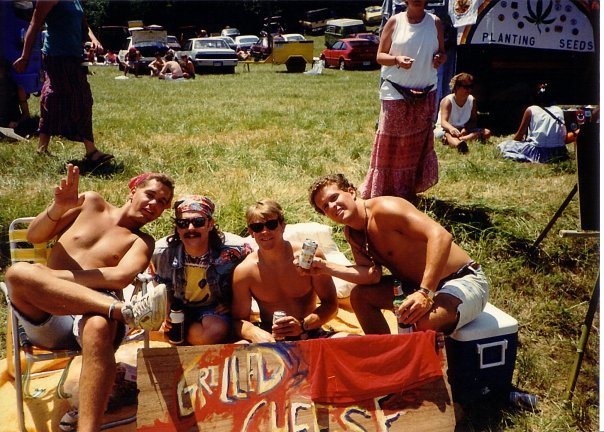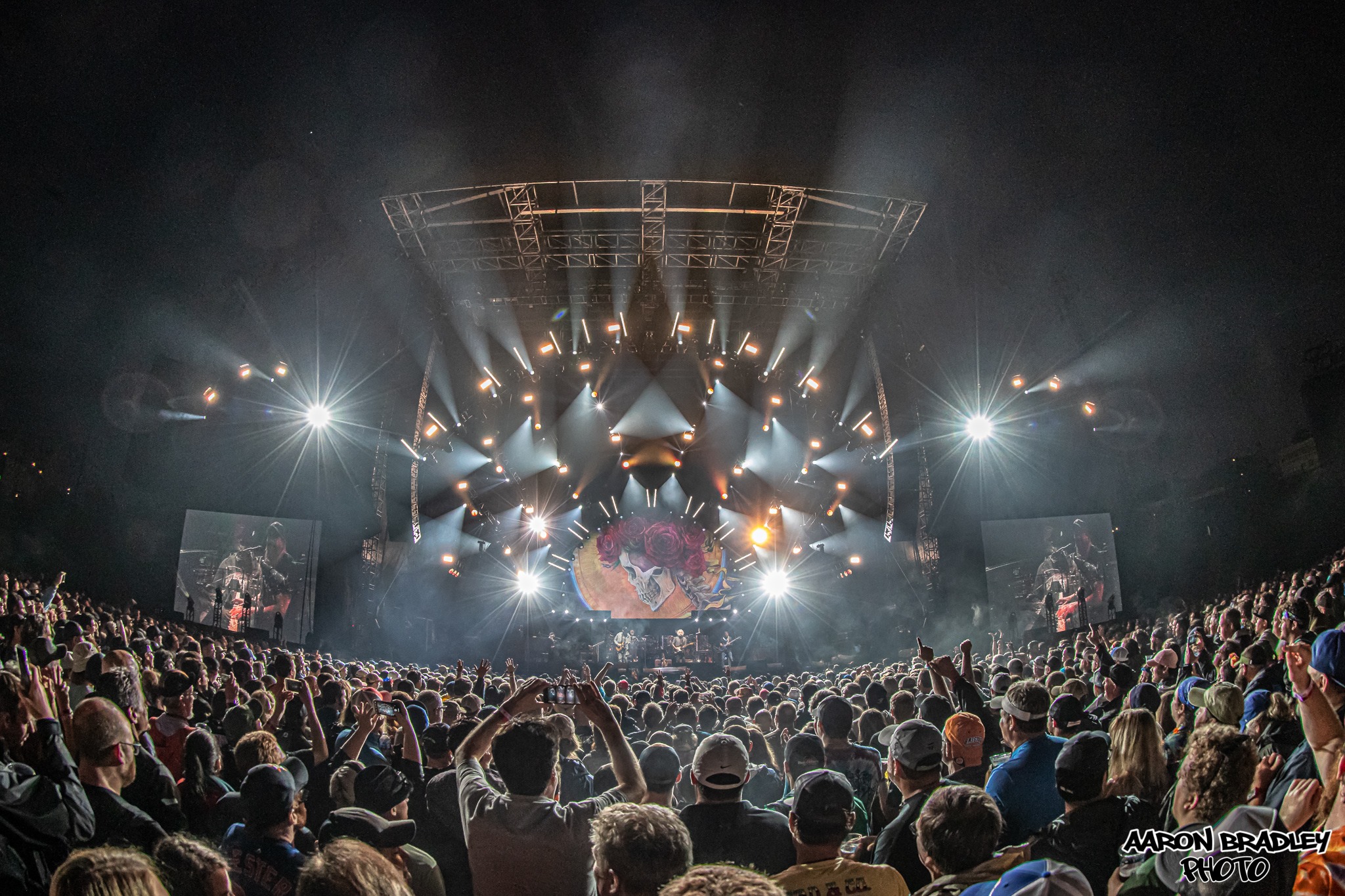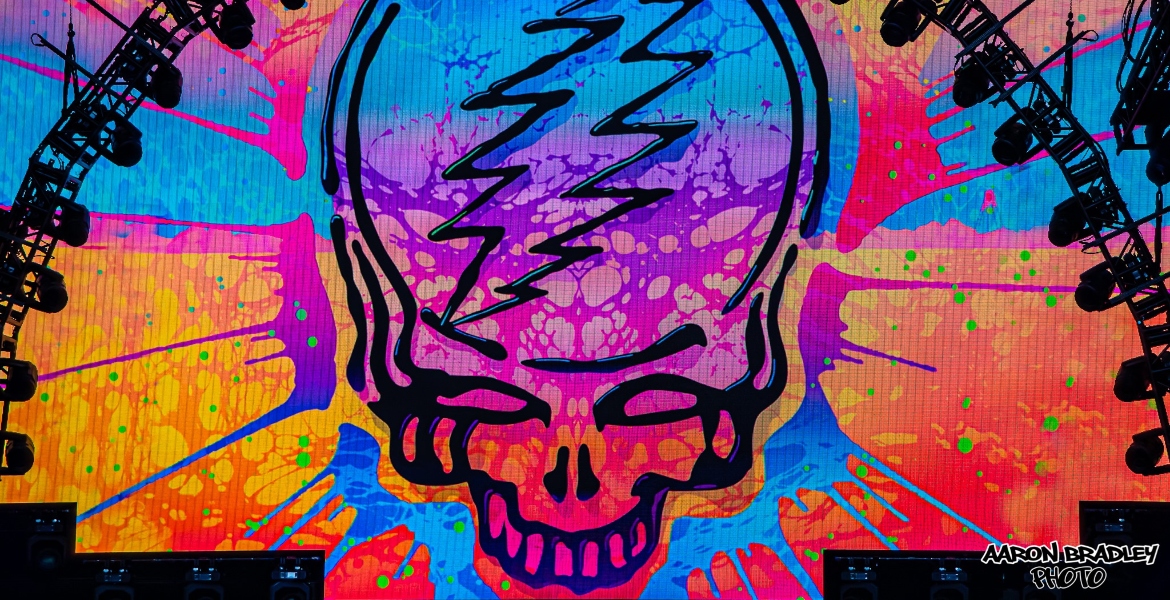Cover Photo by Aaron Bradley
As another successful Dead and Company tour came to an end this past July, I found myself reflecting on a California band just trying to shake things up more than 50 years ago. The Grateful Dead didn’t think this was going to reach past their life span; they weren’t looking to be one of the most popular bands in America, let alone the world. But Jerry, Pigpen, Phil, Bobby, Bill, and Mickey knew they had something different going on, as many Deadheads can also attest, “There’s just something special about the Dead.” I sat down with Greg Sinzheimer, a Chicago family man to talk about his long history with the Grateful Dead and its progression to Dead and Company.
Festival Squad: How did you first hear of the Grateful Dead?
Greg Sinzheimer: I first started listening to them in 1986 and my first show was ’89. I grew up in Indiana and they didn’t tour in Indiana very much. So I would have to leave campus and travel across the Midwest to see them — which we did quite a bit!
We supported our traveling by selling grilled cheeses on the lot. Funny story, my one friend Rob worked in the dorm cafeteria and he stole a big block of American sliced cheese. We went to Aldi and got like 10 loaves of white bread for cheap and took a propane gas stove with us. Rob was an art student and he whipped up the grilled cheese sign. That got us where we needed to go!

FS: Were you hooked right away or was there a defining moment when you got on the bus?
GS: The epiphany moment was really that first show I went to in Louisville, and I didn’t even get in! There’s something about it that I can’t explain – it’s the Deadheads, the lot scene, shakedown. It’s just something you don’t see every day and for someone who had never seen it up until that point, it was great fun. The commonality between all jam band fans alike – be it Deadheads or Phish fans – is the adventurous spirit surrounding the jam scene. You can go out on the road and travel cross country to see your favorite band and meet great people along the way. That’s really how I saw a lot of the country – by following the Dead.
FS: How many shows have you gone to?
GS: With Jerry, I’ve seen the band somewhere between 25-30 times. After Jerry’s passing, in whatever post incarnation, I would guess probably well over 100 shows. I’ve seen them every year since he died, starting with Furthur Festival in 1996, that was the first post-Jerry incarnation. From there they went to the Other Ones, The Dead, Furthur, and Dead and Company.
FS: What were the shows like back then?
GS: I hate to use the word because it’s a little cliche, but they really were surreal. Even while he was alive, you knew that this wasn’t going to last forever, Jerry’s gonna die and this will all be over. You knew every show that you got was a gift, and you didn’t really wanna admit that Jerry was a junkie but you could kinda see. Every time you got to see him it was like Christmas. I feel like we’ve been given an extension through the surviving core four and the other incarnations that they’ve come up with throughout the years. They’re still playing into their 70s, so how could I even think of not going if they’re in the area?! I don’t travel nearly as much as I used to for them because I’m older but it was a gift and still is.
FS: How would you compare the various incarnations to the original band?
GS: The tempo has definitely slowed down, I don’t know if it’s a result of being old, with the exception of John Mayer, or if it’s purposeful with intent. I still love them but that’s the only knock I really have and have heard from others. But in terms of how sets are comprised, it’s pretty much the same, but when Jerry was around there were certain songs that they just shelved and never did again. Whether Jerry just didn’t want to play them or the band didn’t like the song, I don’t know. After Jerry died, they gradually started to add those songs back into the rotation — nothing was off the table. Songs like “St. Stephen” or “Casey Jones”, or “Viola Lee Blues” made it back onto set lists. They’ve gone back in and reached pretty deep in their catalog which is a treat for the fans.
As for jamming well, I think that really depends on who they have in the Jerry slot, whether it’s Warren Haynes, John Mayer or Steve Kimock. I think that keeps it interesting for the four core surviving members. Like what’s in it for them? We know that the fans get pure ecstasy and joy for experiencing their shows. But what’s in it for Bobby, Mickey, Phil, and Bill? This all started because of talented musicians trying to keep it interesting for themselves first and foremost.
FS: You’ve been to a few of the Dead and Co. sets this summer, do any of the nights stand out to you as a highlight?
GS: I was at the Deer Creek, Indiana shows and the Wrigley Field shows in Chicago. I would say the standout for me this tour was Saturday night at Wrigley. We got “Terrapin Station” and “Bertha”! So I would say that was my favorite Dead and Company show to date, in terms of song selection and tempo, and I’ve been seeing them since they started in 2015.
FS: Thoughts on the current Dead and Co. group?
GS: I think the group is great! Initially bringing John Mayer into the fold was met with some criticism from die-hards because he’s pop and this and that. I mean I’m not into his solo stuff but he’s poured his heart and soul into these songs. As talented as John Mayer is, and he’s a blues guitarist first and foremost, to learn a songbook as large as the Grateful Dead is no easy feat, and it speaks volumes of his musicianship. I think its even made him a bit more humble and down to earth hanging with the Dead guys and this scene. He brings new energy and I love the way he plays. I never thought, I don’t think anyone in the world would have pictured him in that slot but they sound good.
FS: Why do you believe Grateful Dead has withstood the test of time?
GS: I guess my answer to that would be because it’s good music. Good music stands the test of time. The Grateful Dead created good music, a touring entity and a business model that’s still being used today in a quite unintentional way. They did it with respect to the environment, everyone they did business with, to their fans and to themselves. I think it’s the most beautiful artistic statement certainly in the history of rock and roll, if not in all music in totality. The way they did and how they did it was good and I think that’s why it’s still going.
If you think about that whole era, the psychedelic movement in San Fransisco in the late 60s, the stars were aligned. I can’t explain it any other way but the stars were aligned, they had to be. The right people had to come together at the right time and they did. I feel like someone who lived during the time Beethoven was alive because I feel so lucky to be able to have seen and continue to see this genius band. I think everyone who’s into this music can say the same. Why isn’t it mainstream? Why isn’t everyone as excited as we are for this? But I mean I’m glad they’re not because that’d make it even harder for me to get a ticket!
FS: What do you believe to be the Grateful Dead legacy?
GS: The godfathers of jam bands, they invented the genre of jamming! Based on each musician’s background in the band and what they brought in terms of the genres they brought – Pigpen lived and breathed the blues. Jerry was a bluegrass guy, he played banjo and bluegrass arrangements. Bobby was a folkie. Phil was a classical music composer student at Berkeley. Bill Krutzmann was an R&B drummer. Micky was off the reservation in terms of his insane percussion; he’s a wacky scientist who pours his soul into those drums. You bring all those things together and add in Robert Hunter lyrics and the improvisational part, which is a jazz space model. You bring all those backgrounds together and if you listen to their early stuff, they sound like a California garage band — which they kinda were. The way they evolved with the music is fascinating to me. They created their own genre of music and they did it with respect to everyone and everything they came into contact with. They created a type of music that is unlike anything I’ve ever heard.
Their legacy is their songbook and it will be around after they’re all gone – the music will live on. Just like Bach, Beethoven, Mozart are long gone but they’re still played on through symphonies and orchestras. There are countless numbers of Grateful Dead tribute bands, just in Chicago, you could probably find one to see every night of the week. That’s going to live on. The beautiful music they created and the way that they did it, will stand the test of time.

